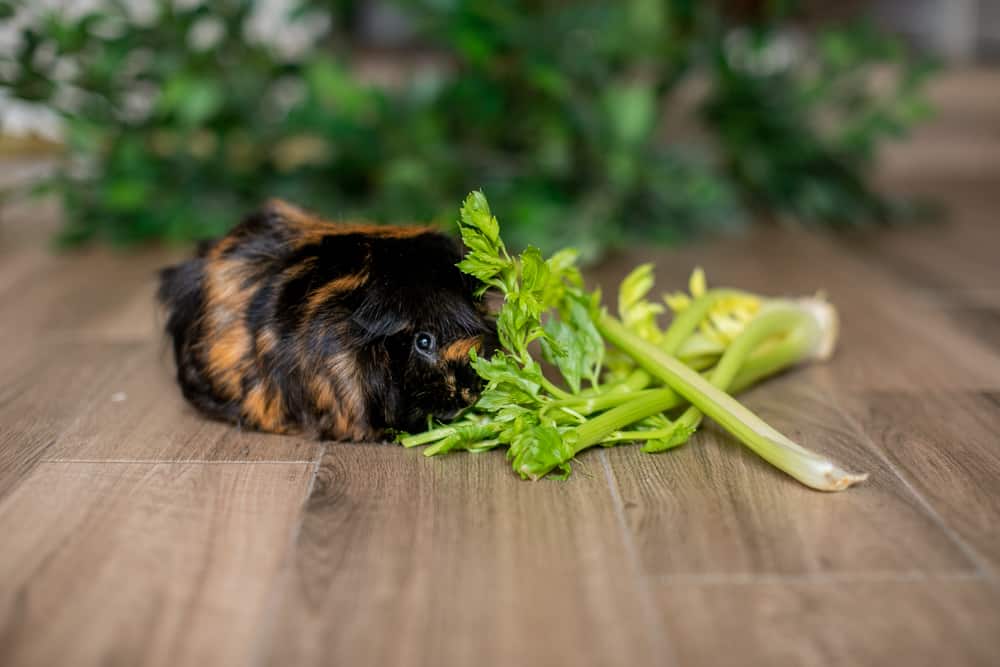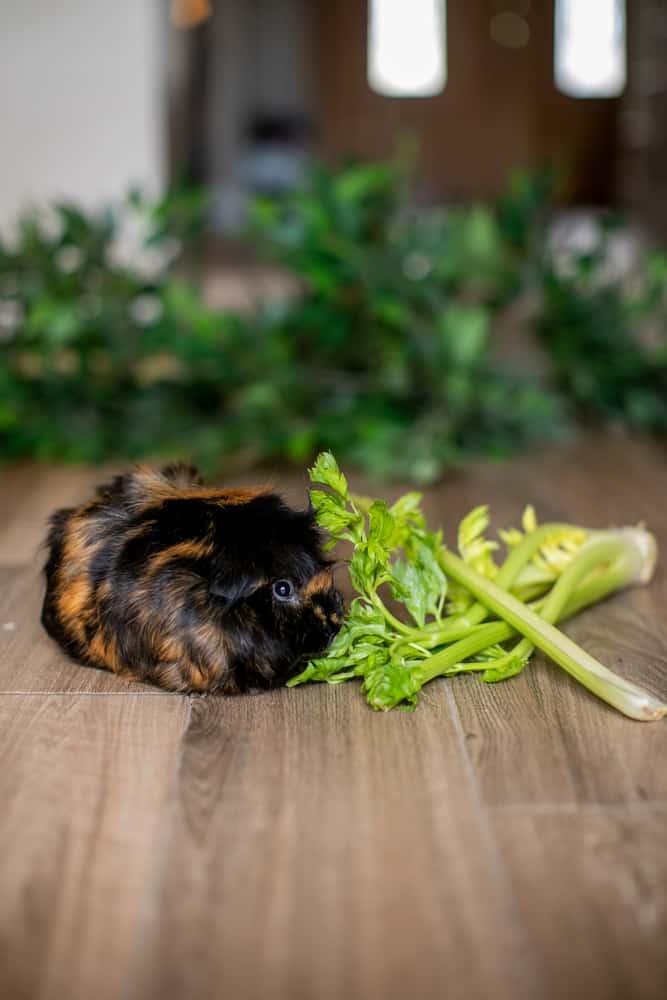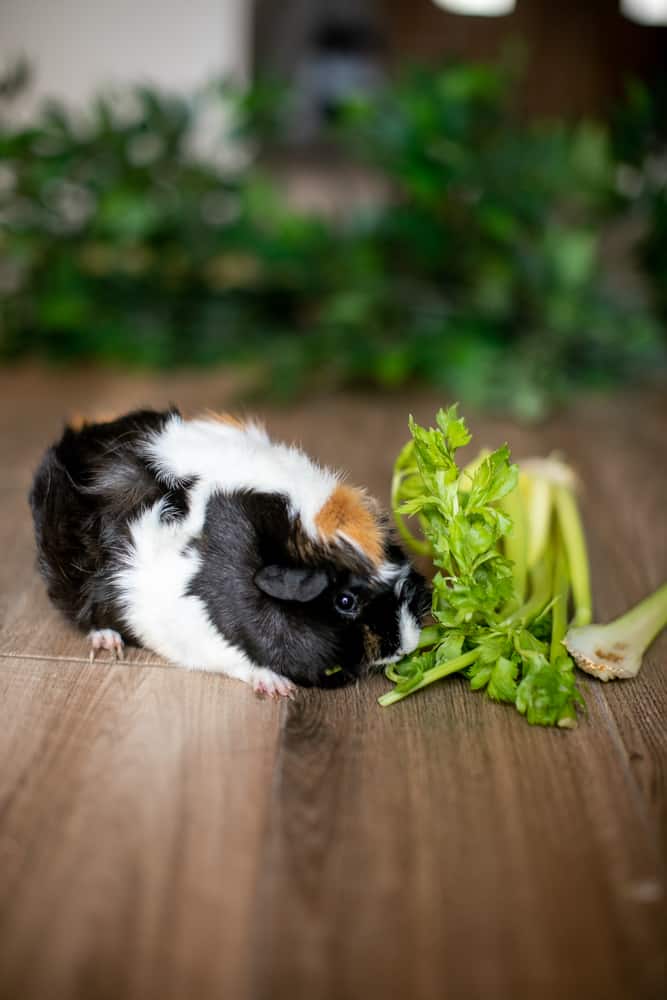As an Amazon Associate we earn from qualifying purchases.
Celery is an ancient vegetable that numerous western civilizations have cultivated. It provides sustenance for both people and animals. Most guinea pigs’ diet consists of hay, guinea pig pellets, fresh fruits, and herbs. As a guinea pig owner, you already know that not all fruit and vegetables are safe for your guinea. You might wonder if this plant is suitable for your pet’s consumption. Is it true, can guinea pigs eat celery?
Can Guinea Pigs Eat Celery?
Celery is a vegetable that guinea pigs can eat in moderation. Celery has high amounts of oxalates packed in it. These oxalates can be dangerous to guinea pigs’ health. Thus, it is advisable to feed celery to your guinea with moderation.

Calcium is also a mineral found in celery that is found in high amounts in most vegetables. Most guinea farmers are careful with the amount of vegetables they feed their guinea pigs. It has high calcium and it is toxic to guinea pigs if they consume a substantial amount. Celery, being a vegetable, falls under the same scrutiny.
Health Benefits of Celery to Guinea Pigs
Similar to how this vegetable is packed with health coverage for humans when consumed, celery can have various health benefits for your guinea pig. Celery has rich nutrients that are necessary for your guinea pig.
Improves Eyesight and Prevents Inflammation
Celery contains high amounts of vitamin A or beta carotene. Vitamin A preserves the eyesight of guinea pigs by slowing down the degeneration of cells in the eye and surrounding optic nerves. It is advisable to feed your guinea pig a moderate amount of celery to prolong their eyesight.
Apigenin is a compound found in celery. Apigenin helps reduce and prevent inflammation of organs. Some research shows that it has anticancer effects minimizing the incidences of cancer in your pet.
Has Antioxidants and Assists in Food Digestion
Celery has minerals that act as antioxidants that help to capture free radicals in the bloodstream. Capturing free radicals in the bloodstream reduces the rate of cell degeneration. A low cell degradation rate may give your guinea pig a longer life because its cells age at a slower pace.

Celery contains a high amount of dietary fiber. While providing negligible nutritional value, fiber adds bulk to the food in the stomach, thereby generating regular and healthy bowel movements. Your guinea pig may go ahead to experience good digestion and scarcely any digestive tract complications from celery.
Promotes Neurogenesis
Neurogenesis is the replacement of old damaged nerve cells with new ones. Nerve cells within the body transmit information between the mind and the rest of the body. With time, nerve cells begin to degenerate, especially during an illness or accident. Apigenin in celery promotes neurogenesis by ensuring the worn-out nerve cells in your guinea pig get replaced with new ones.
Adding Celery on a Guinea Pig’s Diet
Preparing celery for your guinea pig is a simple process that requires minimal effort and time. Below is a step by step guide to assist you in the preparation of celery for your guinea pig:
- Select fresh pieces of celery and ensure that they do not have signs of any pre-existing diseases.
- Wash the selected celery under running clean water. Washing the celery will remove any debris or dirt on the celery. Proper cleaning removes any traces of pesticides, fertilizer, or herbicides that might be harmful to your guinea pig.
- After washing the celery, remove the stalks. The stalks are unnecessary to your guinea pig because guinea pigs love the celery’s leafy parts instead.
- Slice the celery into small chunk-sized pieces to enable the guinea pigs to eat them easily.
Create a vegetable salad if your guinea pig hesitates in eating celery. Mixing celery with your guinea’s usual diet is an effective way of introducing celery into its diet.
Side Effects of Celery in a Guinea Pig’s Diet
You have already appreciated the various health benefits celery can have for your guinea pig. However, some harmful side effects can arise from giving a guinea pig inappropriately high amounts of celery.

Cardiovascular and Urinary Complications
Celery has a high sodium concentration, containing around 80mg of sodium per 100g of celery. A diet that includes a high amount of sodium presents several health conditions such as high blood pressure. High blood pressure may lead to eventual cardiovascular diseases such as hypertension, strokes, and heart attacks.
However, celery has one of the highest concentrations of calcium and oxalic acid among the known vegetables. These acids are prime factors in developing kidney and bladder stones in guinea pigs. Kidney stones can block urinary tracts and prevent the expulsion of waste from the guinea pig’s body. Bladder stones may tear a guinea’s bladder walls, resulting in blood in the pig’s urine.
Bloating and Allergic Reactions
Foods with high amounts of fiber, such as celery, promote the development of bloating. This condition arises from the excess gas developed during the attempted digestion of fiber by the body. The bloating causes the guinea pig to experience gastric discomfort, which can be painful.
Although rare, the introduction of celery into your guinea pig’s diet may lead to the development of unforeseen allergic reactions caused by underlying genetic mutations. Should your guinea pig suffer from an allergic reaction to celery, stop further feeding and administer first aid by giving it water. In case the pig’s condition worsens, please take it to the nearest vet for medical assistance.
Related Questions
Can Guinea Pigs Eat Celery Stalks?
Guinea pigs can eat celery. However, most guinea pigs may shy away from eating celery stalks. Celery stalks are rigid and challenging for your guinea pig to chew and swallow.
Which Vegetables Are Safe For Your Guinea Pig?
Vegetables and fruits such as lettuces, kales, green peppers, and red peppers can be prepared regularly in measurements of around one cup per day to feed your guinea pig. This diet should make up the bulk of their diet.
Conclusion
Celery is a good source of vitamins and vital minerals for guinea pigs. We recommend feeding your guinea pig moderate amounts of celery, preferably 2-3 times a week, to minimize the potential health risks resulting from excess intake of celery.